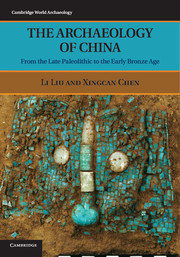The Archaeology of China From the Late Paleolithic to the Early Bronze Age Cambridge World Archaeology Series
Langue : Anglais
Auteurs : Liu Li, Chen Xingcan

This book explores the roles of agricultural development and advancing social complexity in the processes of state formation in China.
This book explores the roles of agricultural development and advancing social complexity in the processes of state formation in China. Over a period of about 10,000 years, it follows evolutionary trajectories of society from the last Palaeolithic hunting-gathering groups, through Neolithic farming villages and on to the Bronze Age Shang dynasty in the latter half of the second millennium BC. Li Liu and Xingcan Chen demonstrate that sociopolitical evolution was multicentric and shaped by inter-polity factionalism and competition, as well as by the many material technologies introduced from other parts of the world. The book illustrates how ancient Chinese societies were transformed during this period from simple to complex, tribal to urban, and preliterate to literate.
1. Chinese archaeology: past, present, and future; 2. Environment and ecology; 3. Foragers and collectors in the Pleistocene-Holocene transition (24,000–9000 cal. BP); 4. Domestication of plants and animals; 5. Neolithization: sedentism and food production in the Early Neolithic (7000–5000 BC); 6. Emergence of social inequality: the Middle Neolithic (5000–3000 BC); 7. Rise and fall of early complex societies: the Late Neolithic (3000–2000 BC); 8. Formation of early states in the Central Plain: Erlitou and Erligang (1900/1800–1250 BC); 9. Bronze cultures of the north frontiers and beyond during the early second millennium BC; 10. The Late Shang dynasty and its neighbors (1250–1046 BC); 11. Chinese civilization in comparative perspective.
Li Liu is Sir Robert Ho Tung Professor in Chinese Archaeology in the Department of East Asian Languages and Cultures at Stanford University, California. She is the author of two books, The Chinese Neolithic: Trajectories to Early States and (with Xingcan Chen) State Formation in Early China, as well as more than seventy journal articles in both English and Chinese.
Xingcan Chen is Senior Fellow and Deputy Director of the Institute of Archaeology at the Chinese Academy of Social Sciences as well as Professor in the Department of Archaeology, Graduate School, Chinese Academy of Social Sciences. He is the author of numerous articles and books, including The History of Chinese Prehistoric Archaeology (1895–1949), Essays on Archaeology and (with Li Liu) State Formation in Early China.
Xingcan Chen is Senior Fellow and Deputy Director of the Institute of Archaeology at the Chinese Academy of Social Sciences as well as Professor in the Department of Archaeology, Graduate School, Chinese Academy of Social Sciences. He is the author of numerous articles and books, including The History of Chinese Prehistoric Archaeology (1895–1949), Essays on Archaeology and (with Li Liu) State Formation in Early China.
Date de parution : 04-2012
Ouvrage de 498 p.
17.8x25.1 cm
Date de parution : 04-2012
Ouvrage de 498 p.
18.5x26.2 cm
© 2024 LAVOISIER S.A.S.



